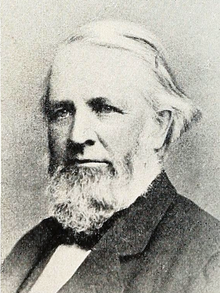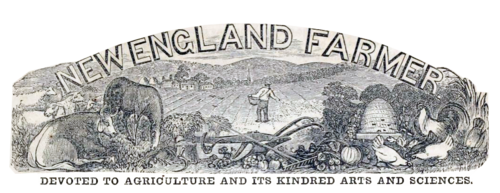User:Simtropolitan/Sandbox/HFF
Henry Flagg French | |
|---|---|
 Henry F. French c. 1866 | |
| Assistant District Attorney of Suffolk County, Massachusetts | |
| In office 1862–1865 | |
| President of the Massachusetts Agricultural College (now the University of Massachusetts Amherst) | |
| In office 1864–1866 | |
| United States Assistant Secretary of the Treasury | |
| In office 1876–1885 | |
| Personal details | |
| Born | August 14, 1813 Chester, New Hampshire |
| Died | November 29, 1885 (aged 72) Concord, Massachusetts |
| Spouse(s) | Anne Richardson (1838-1856) Pamela Mellen Prentiss (1859-1881not 1885) |
| Alma mater | Harvard Law School[note 1] |
| Signature | |
Henry Flagg French (August 14, 1813 – November 29, 1885) was an American agriculturalist, inventor, lawyer, judge, postmaster, writer, assistant secretary of the treasury, and the first president of the Massachusetts Agricultural College (now the University of Massachusetts Amherst). He was also a prominent figure in many agricultural societies, vice president of the United States Agricultural Society at one time, and a patent holder. Though no longer a regular household name, he is perhaps best known for his development and popularization of the French drain, as well as being the father of renowned sculptor Daniel Chester French, who created the iconic statue of Abraham Lincoln at the Lincoln Memorial.
Early life and education[edit]
The son of Daniel and Sarah W. Bell French (née Flagg), Henry French was born on August 14, 1813 on a farm in Chester, New Hampshire.1 2 3 4 5 [1] As a boy, he was educated at a number of respected institutions, including the Pembroke, Pinkerton, and Derby academies. Following his schooling, French spent his next few years as a student at Harvard Law School, subsequently studying with his father, a former attorney general of New Hampshire, at his office in Chester. 1 2 3 4 After thorough preparation, French passed the state exam and was admitted to the New Hampshire Bar on his 21st birthday, August 14, 1834. 2 3 4 5 OLD picture of Chester from 1830s if possible? or of his father? Contrary to many biographies, French never actually attended college though an honorary master's degree was conferred upon him by Dartmouth College in 1852. 456
Marriage and family[edit]
On October 9,1838 French married Anne Richardson, daughter of Chief Justice William Merchant Richardson, and Betsey Richardson (née Smith).25 The couple would have four children: Hariette Van Mater, William M., Sarah Flagg and Daniel Chester. 2 Anne French became very ill only a few years after Daniel was born, passing away on August 29, 1856 at the family estate in Exeter. Her death left a lasting impact on the family, and a few years later they moved away out of New Hampshire, settling in Cambridge, Massachusetts. Henry French would remarry three years later to Pamela Mellen Prentiss [sic] of Keene, New Hampshire, daughter of John Prentiss, Esq., the chief editor of the Keene Sentinel. The couple were married on September 29, 1859, and had no children.
Early career[edit]
For his first six years of practice, French remained in Chester, working alongside his father until his death in 1840. He would also serve as the town's postmaster during his last year residing there. 1234 In the fall of 1841, he relocated briefly to Portsmouth, moving again to Exeter, New Hampshire in the next year. Among his many diverse titles, French served as the Rockingham County solicitor from 1838 through 1848, and then as a county bank commissioner from 1848 to 1852. 1 2 3 4 5 Around this time he also began to contribute to the New England Farmer, the The Country Gentleman and the Massachusetts Ploughman, among other agricultural periodicals.
Agricultural work[edit]
Writing[edit]
Invention of the French Drain[edit]
Massachusetts Agricultural College[edit]
Legal and governmental careers[edit]
Philosophy and personal views[edit]
Legacy[edit]
Although Henry F. French is nearly forgotten today, he did leave a lasting impact on civil and agricultural engineering with his development of the French drain, which is still well known and widely used in both basements and farming to present-day. His "Treatise on Drainage" would be published for several more editions and was used well into the 20th century by students, farmers and engineers alike. In the 19th century French was nationally known for his expertise in farming, with much of his work on tile draining and other agricultural subjects being cited and republished in magazines across much of the United States.
Despite this long list of achievements, French is often best remembered for being the father of Daniel Chester French, and it was due to his District of Columbia connections that he had been able to convince his son to come to the capital and ultimately receive commission for his iconic statue at the Lincoln Memorial.
| "Stick to the farm, young men. Now when land and its products, the true wealth of the nation, are within your control...now, when the nations of the earth are re-converting their plowshares and pruning hooks, into swords and spears, when great armies are gathering together to destroy each other, and lay waste the beautiful earth, which God has given to man to "till and to keep;" now, when the labor of whole countries is diverted from producing the moans of feeding and clothing and sheltering and blessing mankind, to a worse than idle consumption of the produce of your labor."[2] |
| —Henry Flagg French, excerpt from "Stick to the Farm", The Country Gentleman, April 27, 1854 |
Selected works[edit]
Though he only published one full book, French was very a prolific writer and wrote hundreds of for a number of agricultural journals. His book on farm drainage was a great success, with acclaim from farmers, students and engineers from all around the United States.
- Farm Drainage; the Principles, Processes, and Effects of Draining Land, French's bestselling book giving full details on tile drainage and the use of the French drain. It was this book that would ultimately popularize this method and made
- English Plows and Plowing, Report of the Commissioner of Patents for the Year 1859, Agriculture . p.139-160. Advances in plowing methods and technologies such as the steam plow.
- Observations on English Husbandry.Report of the Commissioner of Patents for the Year 1860, Agriculture . p.140-165.
- Agricultural Colleges, Report of the Secretary of Agriculture for the Year 1865. p. 137-186. A thorough history of agricultural colleges in the United States and Europe, along with their academic curricula.

In the span of nearly 20 years Henry F. French wrote over 120 articles for the New England Farmer, a paper operated by his brother-in-law, Simon Brown, which circulated around New England and much of the Northeast United States, with letters from readers as far away as Maryland. The subjects of these articles were extremely diverse, with many having a strictly practical tone, while others being more humanitarian and philosophical in nature. In them he discussed everything from his travels to Europe, to farm maintenance, drainage, orcharding, dairy farming, the rights of women, the advantages of an education, and the aim of establishing a more agrarian, egalitarian American society.
|
|

Printed on an annual basis with 12,000 copies each, these reports, from 1854 until 1880, were compiled and edited by Charles L. Flint. Each contains developments in cultivation techniques, advances in agricultural technology, accounts of different farming localities and architecture, and the annual financial and crop returns of the state's agricultural societies.
|
|

It is unavailable on Google Books or the Internet Archive and though it exists as microfilm in some libraries,
many of these collections are incomplete, with some volumes having not been widely available since their original publishing.
This section serves as a placeholder until any institutions or individuals can scan/upload issues printed between 1853 and 1880.
See also[edit]
- ^ Contrary to some posthumous biographies, French never actually attended college, only going to law school so he to study for the state bar exams. This was brought up in a letter by his daughter, Harriet V. French, after a Mr. W.H. Bowker mistakenly said French was a Dartmouth alumnus in his dedication speech of UMass Amherst's French Hall.
Notes[edit]
References[edit]
- ^ bowler, henry f. french and the durfee plant hosues
- ^ Blake, ed. (March 1850). "Hymn; written for the dedication of a school house at Lynn". The Massachusetts Teacher. 66 (3): 79.
{{cite journal}}:|first=missing|last=(help); Unknown parameter|DUPLICATE_volume=ignored (help)
External links[edit]
Category:1813 births Category:1885 deaths Category:American farmers Category:American inventors Category:American judges Category:Harvard Law School alumni Category:Agriculturalists from Massachusetts Category:Massachusetts lawyers Category:New Hampshire lawyers Category:People from Rockingham County, New Hampshire Category:People from New Hampshire Category:People from Massachusetts Category:University of Massachusetts Amherst people Category:United States Assistant Secretaries of the Treasury
